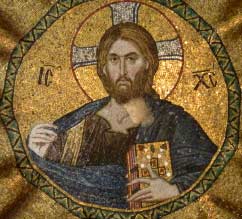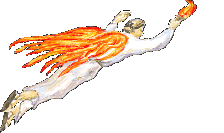|
 Those
readers who have encountered 'Oneness' Pentecostals will not be
surprised that some remain unmoved at the recitation of the visions of God
experienced by Old and New Testament saints. No matter how many of these you list, this faction still
insist that Stephen cannot have seen anything, but merely felt moved to deliver himself of a vacuous
platitude...that Jesus is God and He has a mighty right hand! But the Bible does say
that Stephen saw something. He "gazed into heaven and saw the glory of God"! Those
readers who have encountered 'Oneness' Pentecostals will not be
surprised that some remain unmoved at the recitation of the visions of God
experienced by Old and New Testament saints. No matter how many of these you list, this faction still
insist that Stephen cannot have seen anything, but merely felt moved to deliver himself of a vacuous
platitude...that Jesus is God and He has a mighty right hand! But the Bible does say
that Stephen saw something. He "gazed into heaven and saw the glory of God"!
It is difficult to confirm from the Bible that "the glory of God" is
invisible: "The sight of the glory of the LORD was like a consuming fire on the top
of the mountain in the eyes of the children of Israel."
(Exodus 24:17).
What does the "glory of God" look like? Ezekiel got a glimpse of it:
"And above the firmament over their heads was the likeness
of a throne, in appearance like a sapphire stone; on the likeness of the
throne was a likeness with the appearance of a man high above it. Also
from the appearance of His waist and upward I saw, as it were, the color
of amber with the appearance of fire all around within it; and from the
appearance of His waist and downward I saw, as it were, the appearance
of fire with brightness all around. Like the appearance of a rainbow in
a cloud on a rainy day, so was the appearance of the brightness all around
it. This was the appearance of the likeness of the glory of the
LORD." (Ezekiel 1:26-29).
Ezekiel, like Stephen, saw something, which he could, and did, describe using spatial language. The
relation of 'what he saw' to 'what is there' is not simple, but the vision
is real and has meaning.
This "glory of God" isn't a faint Tinker-belle glimmer, its flickerings
missed if you blink, but a manifestation so powerful it has driven folks
right out onto the sidewalk: "And it came to pass, when the priests
came out of the holy place, that the cloud filled the house of the LORD,
so that the priests could not continue ministering because of the cloud;
for the glory of the LORD filled the house of the LORD."
(1 Kings 8:10-11).
In using directional signals relative to the "glory of God",
Stephen was following a well-worn Biblical tradition: "And behold, the glory of the God of
Israel came from the way of the east. His voice was like the sound of many
waters; and the earth shone with His glory. It was like the appearance
of the vision which I saw — like the vision which I saw when I came to
destroy the city. The visions were like the vision which I saw by
the River Chebar; and I fell on my face. And the glory of the LORD
came into the temple by way of the gate which faces toward the east."
(Ezekiel 43:2-4). Ezekiel saw "the glory of the God of Israel"
approach from the east, not from the
west. So it is possible to spot the "glory of God" relative
to compass direction. It's not like it's invisible!
The whole point of the "glory of God" is to be a visible manifestation
of God's presence, a sign of His mercy. To assure the children in
the wilderness of His leading, He opened a window onto this dark and dismal
world, allowing a minute fraction of the radiant glory of the Father of
lights to stream into our lower realm: "Then the glory of the LORD
appeared to all the people." (Leviticus 9:23). It is far from
obvious how the "glory of God" could serve its intended purpose
were it invisible.
In their quest to rid the Bible of Stephen's corrosive vision,
'Oneness' apologists set fundamental Bible truths about God at variance
with God's fondness for revealing Himself through visions. Can tying God's hands with
His omnipresence and incorporeality keep Him from revealing Himself to man as He promised Moses He would do,
through visions?: "Hear now My words: If there is a prophet among you, I, the LORD, make Myself
known to him in a vision; I speak to him in a dream."
(Numbers 12:6)? Of course not! If
God in His mercy condescends to our weakness by revealing Himself in a
manner we can apprehend, then we should learn from His self-revelation
as grateful students, not 'correcting' the material to our liking as imperious
editors. Biblical visions of God are not lying phantasms sent by
demons, but true self-revelations of the living God, stamped with His love,
proportioned to our earth-bound frailty.
The Greek word 'dexios' used in Acts 7:55 means 'at the right hand side, in
close proximity'. Not a vague, diffuse symbol of 'power,' here is another Biblical
use of the same phrase: "Then two robbers were crucified with Him, one on the
right ['ek dexion'] and another on the left."
(Matthew 27:38, Mark 15:27, Luke 23:33).
Though airy theosophy about 'at the right hand' as a 'symbol' of
'power' is a frequent recourse of 'Oneness' Pentecostals who hope to spiritualize
Stephen's vision away, there's no ambiguity about what Stephen reported
seeing, nor reason to discount his testimony.
The word literally expresses a spatial relationship, by extension a political relationship,
of ruling through deputed power: "And He said to her, 'What do you wish?' She said to
Him, 'Grant that these two sons of mine may sit, one on Your right hand ['ek dexion']
and the other on the left, in Your kingdom.'" (Matthew 20:21). There's no problem,
in Luke 1:11, understanding where the angel was standing relative to the altar: "Then an
angel of the Lord appeared to him, standing on the right side ['ek dexion'] of the altar
of incense." This is the same phrase used in Acts 7:55.
The image of sharing the throne, seated at the right hand of the sovereign,
was widely recognizable in the ancient world. An example from Jewish
history: "When the wedding was over, Alexander [Balas] wrote to Jonathan,
the high priest, and desired him to come to Ptolemais. So when he
came to these kings, and had made them magnificent presents, he was honoured
by them both. Alexander compelled him also to put off his own garment,
and to take a purple garment, and made him sit with him on his throne;
and commanded his captains that they should go with him into the middle
of the city, and proclaim that it was not permitted to any one to speak
against him, or to give him any disturbance." (Josephus, Antiquities
of the Jews, Book XIII, Chapter IV. 2).
God has always revealed Himself to man in figure and vision. The seventy
elders of Israel saw God: "Then went up Moses, and Aaron, Nadab, and
Abihu, and seventy of the elders of Israel: And they saw the God of Israel:
and there was under his feet as it were a paved work of a sapphire stone,
and as it were the body of heaven in his clearness."
(Exodus 24:9-10).
The relation between percept, what is experienced, and what is real is
complex,-- which is also the case with every-day sight. We don't grasp
reality entire with our eyes, not even the physical reality to which our
eye-sight is proportioned.
These visions which God has granted to man cannot be construed as snapshots,
showing Him, true-to-life, relaxing at home. Yet none of these visions
is without meaning. Why does God speak to man in visions, instead of giving
it to us straight? A common conjecture is that we can't take it straight:
"One would likely then imagine that the heavens beyond really are
filled with bands of lions and horses, that the divine praises are, in
effect, great moos, that flocks of birds take wing there or that there
are other kinds of creatures all about or even more dishonorable material
things...But if one looks at the truth of the matter, the sacred wisdom
of scripture becomes evident, for, when the heavenly intelligences are
represented with forms, great providential care is taken to offer no insult
to the divine powers, as one might say, and we ourselves are spared a passionate
dependence upon images which have something of the lowly and the vulgar
about them. Now there are two reasons for creating types for the typeless,
for giving shape to what is actually without shape. First, we lack the
ability to be directly raised up to conceptual contemplations. We need
our own upliftings that come naturally to us and which can raise before
us the permitted forms of the marvelous and unformed sights." (Pseudo-Dionysius
the Areopagite, The Celestial Hierarchy, Chapter Two, 137D-140A).
What did Stephen see? He saw something like what the elders of Israel
saw. Is this vision a snapshot of the seating arrangements in heaven? No, yet what
does this vision mean? Nothing at all, just a truism about God's mighty right hand? No, Stephen's
vision shows a relation between God the Father and Jesus Christ, and a relation is not possible
between one term. It had been prophesied that the Messiah would wind up
just where He did: "The LORD said unto my Lord, Sit thou at my right
hand, until I make thine enemies thy footstool." (Psalm 110:1). Stephen
saw Jesus Christ, the Messiah, just where He ought to be, ruling through
power flowing to Him from God the Father.

David's Son
The Lord applied Psalm 110 to Himself:
|




